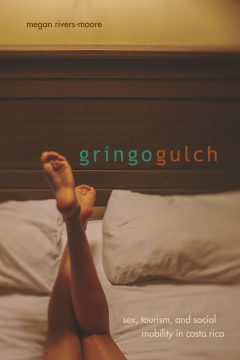
Megan Rivers-Moore
Associate Professor
| Degrees: | Ph.D. (Cambridge), MA (Toronto), BA Hons (York) |
| Phone: | 6135206645 |
| Email: | meganriversmoore@cunet.carleton.ca |
Megan Rivers-Moore is an Associate Professor at the Feminist Institute of Social Transformation at Carleton University. Her research focuses on how gender and sexuality operate transnationally, including projects on sex tourism in Costa Rica, sex worker organizing across Latin America, and clandestine abortion. Her book Gringo Gulch: Sex, Tourism, and Social Mobility was published in English by the University of Chicago Press and in Spanish by the University of Costa Rica Press.
Rivers-Moore’s research takes place at the intersections of sociology, gender studies, and Latin American and Caribbean studies. Engaged in both academic and activist life in Costa Rica, she particularly interested in exploring how sexuality operates transnationally. Other research interests include gendered affective labour, travel and tourism, race and ethnicity, postcolonial and transnational feminisms, and qualitative methods.
Courses taught:SXST2101 Introduction to Critical Sexuality Studies; WGST3001 Theory and Research in Feminist Social Transformation; LACS4001/WGST4812_5902 Sexuality and Reproductive Justice in the Americas
Research areas of interest: sex and sexuality; sex work; gender and work; Latin America; reproductive justice; postcolonial and transnational feminisms
Recent Publication
Gringo Gulch: Sex, Tourism, and Social Mobility in Costa Rica
 The story of sex tourism in the Gringo Gulch neighborhood of San José, Costa Rica could be easily cast as the exploitation of poor local women by privileged North American men—men who are in a position to take advantage of the vast geopolitical inequalities that make Latin American women into suppliers of low-cost sexual labor. But in Gringo Gulch, Megan Rivers-Moore tells a more nuanced story, demonstrating that all the actors intimately entangled in the sex tourism industry—sex workers, sex tourists, and the state—use it as a strategy for getting ahead.
The story of sex tourism in the Gringo Gulch neighborhood of San José, Costa Rica could be easily cast as the exploitation of poor local women by privileged North American men—men who are in a position to take advantage of the vast geopolitical inequalities that make Latin American women into suppliers of low-cost sexual labor. But in Gringo Gulch, Megan Rivers-Moore tells a more nuanced story, demonstrating that all the actors intimately entangled in the sex tourism industry—sex workers, sex tourists, and the state—use it as a strategy for getting ahead.
Rivers-Moore situates her ethnography at the intersections of gender, race, class, and national dimensions in the sex industry. Instead of casting sex workers as hapless victims and sex tourists as neoimperialist racists, she reveals each group as involved in a complicated process of class mobility that must be situated within the sale and purchase of leisure and sex. These interactions operate within an almost entirely unregulated but highly competitive market beyond the reach of the state—bringing a distinctly neoliberal cast to the market. Throughout the book, Rivers-Moore introduces us to remarkable characters—Susan, a mother of two who doesn’t regret her career of sex work; Barry, a teacher and father of two from Virginia who travels to Costa Rica to escape his loveless, sexless marriage; Nancy, a legal assistant in the Department of Labor who is shocked to find out that prostitution is legal and still unregulated. Gringo Gulch is a fascinating and groundbreaking look at sex tourism, Latin America, and the neoliberal state.
Selected Publications:
- (with Koen Voorend) (2020). “Política social y la politización de la migración en América Latina”. In Puentes, no muros: Contribuciones para una política progresista en migraciones, edited by Dr. Carlos Sandoval García. Mexico: CLACSO.
- (with Kate Hardy) (2018). “Compañeras de la calle: Sex Worker Organising in Latin America.” Journal of Social History and the History of Social Movements. Volume 59: 97-114.
- (2018) “We fight with God’s weapons: Sex work and pragmatic penance in neoliberal Costa Rica.” Signs. 43(1): 851-876.
- (2016) Gringo Gulch: Sex, Tourism, and Social Mobility in Costa Rica. Chicago: University of Chicago Press.
- (2015) “Esperarás y esperarás: Trabajo sexual, gobernanza neoliberal, y la esperanza.” Anuario de Estudios Centroamericanos. Volume 41: 249-278.
- (2013) “Affective sex: Beauty, race, and nation in the sex industry.” Feminist Theory. 14 (2): 153-169.
- (2012) “Almighty Gringos: Masculinity and Value in Sex Tourism.” Sexualities, 15 (7): 850-870.
- (2010) “But the kids are ok: Motherhood, consumption and sex work in neoliberal Latin America.” British Journal of Sociology. 61(4): 716- 736.
Projects:
- Sex work, Covid-19, and mutual aid in Latin America and the Caribbean; clandestine abortion in Costa Rica
In the Media:
- Rivers-Moore, M. (2022). In Latin America, not only abortions but miscarriages can lead to jail time. The Conversation.
- Rivers-Moore, M. (2016). On being productive and reproductive at the same time. Tenure, She Wrote.